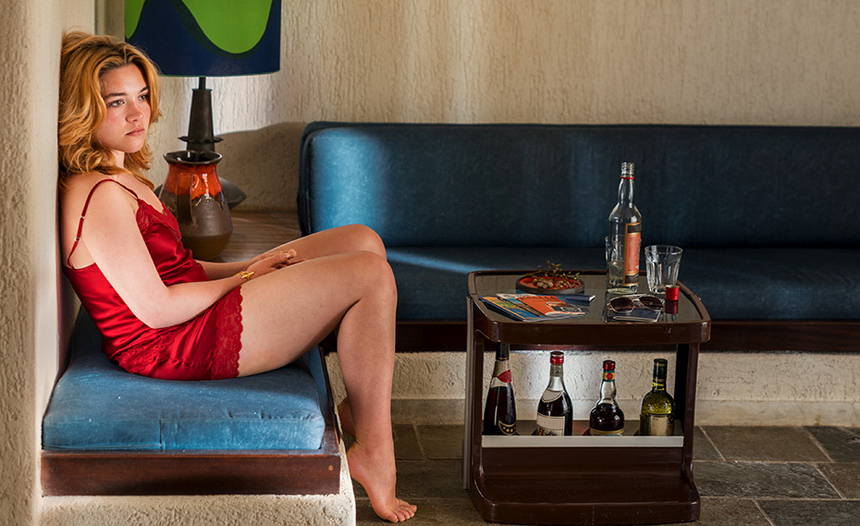Review: THE LITTLE DRUMMER GIRL, Park Chan-wook's Engrossing TV Debut

A new Park Chan-wook project is always something to get very excited about, but there was extra reason to get worked up last year when it was announced that the Korean master filmmaker was making his first foray into television, to adapt the John le Carré novel The Little Drummer Girl into a six-part mini-series, with Lady Macbeth star Florence Pugh in the lead and Alexander Skarsgard and Michael Shannon also along for the ride. The only question was how such a singular cinematic voice would meld with the BBC, a state-run broadcaster responsible for decades worth of quality programming, but not exactly known for working with auteurs.
Three episodes in, I'm happy to convey that The Little Drummer Girl is an effortlessly engaging espionage yarn, which is elevated by Park's strong mise-en-scene (though it is a muted version of his more lush cinematic visuals), as well as the complex and playful tapestry of obsession and identity he weaves throughout the story. The spy sequences are brilliantly executed, but unlike most espionage thrillers, here they serve as tense window-dressing for the rich psychological exploration of the show's fascinating main character, played by a superb Pugh, proving here that Lady Macbeth was no fluke, and then some.
The series kicks off in Germany in the late 1970s with a tense sequence in which Palestinian terrorists murder an innocent Jewish civilian. This sparks off an inter-agency investigation and in comes the Israeli agent Martin Kurtz (Shannon), who begins to track the terror cell with the help of German authorities. Back in London, Charlie Ross (Pugh) is a young actress struggling through auditions and working with a small local theatre troupe.
One day, thanks to a mysterious benefactor, the troupe is whisked off to a paid-for rehearsal trip to Greece. Once there, Charlie meets the dashing and mysterious Becker (Skarsgard). Though she brushes him off at first (while everyone else in the troupe fawns over him), her curiosity eventually gets the better of her. She accepts his offer to go with him to Athens. It is there that she begins to learn the truth, but this truth only exposes her to even deeper deception, of which she can now be an orchestrator, if she so chooses.
Following the series' opening terrorism set piece, Park introduces us to Charlie, who wrongfoots us straight away as she perfectly performs a part during an audition. This introduction is crucial, as it demonstrates the mutability of Charlie's identity, and what we will later recognize as a passion for escape and a desire to feel and experience something more intense than what her own life has been able to provide her with. Her heart's desire, which will lead her to her greatest performance, is just around the corner, but she doesn't know it yet.
Charlie is a complicated character who embodies several motives at any one time and Pugh excels as she presents her first as a strong, independently-minded free spirit and later as a vulnerable young woman unsure of her own identity. We quickly realize she embodies both of those traits at all times and as Charlie develops into a sharp-witted manipulator, seeing the layers of performance cascade over her face in some of the series' choicest scenes is a joy to behold. Case in point is a brilliant moment at a border crossing in episode three, when she masks real fear of being found out with fake nerves designed to get her caught for something less serious. The true and fabricated anxiety mingle with a sense of excitement that builds within her, not to mention a different type of fear: beginner's nerves.
For the first time since Sympathy for Mr. Vengeance, Park isn't working with his longtime collaborator, cinematographer Chung Chung-hoon (presumably busy with several Hollywood offers after his excellent work on the horror smash IT). Instead, he has paired for the first time with Kim Woo-hyung, another compatriot and one of the most highly-regarded DPs in Korea, having worked with directors like Im Sang-soo (The President's Last Bang), Choi Dong-hoon (Assassination) and Jang Sun-woo (Resurrection of The Little Match Girl), among others.
Kim's fluid lensing boasts a wonderful composition that accentuates the layers of construction and control in the story, as characters in the foreground are often examined by those in the background, while occasionally further layers are uncovered as a subsequent shot will reveal yet another person spying on the observer. Combined with beautiful period production design by Maria Djurkovic, the show is reminiscent of prior le Carré adaption Tinker Tailor Soldier Spy, which features among Djurkovic's most notable credits. What sets the look apart here is the focus on strong primary colors, notably among the wardrobe of the main characters, as bold hues switch along with their moods and roles.
With the momentum quietly building through each episode, there's a real sense that danger lies ahead and with Charlie's path still far from clear, there's much to look forward to in the back half of Park's involving TV debut.
Be sure to check back in three weeks' time, when we sum up the last three episodes of The Little Drummer Girl, currently airing on the BBC. The show premieres on AMC this coming Monday, November 19.







